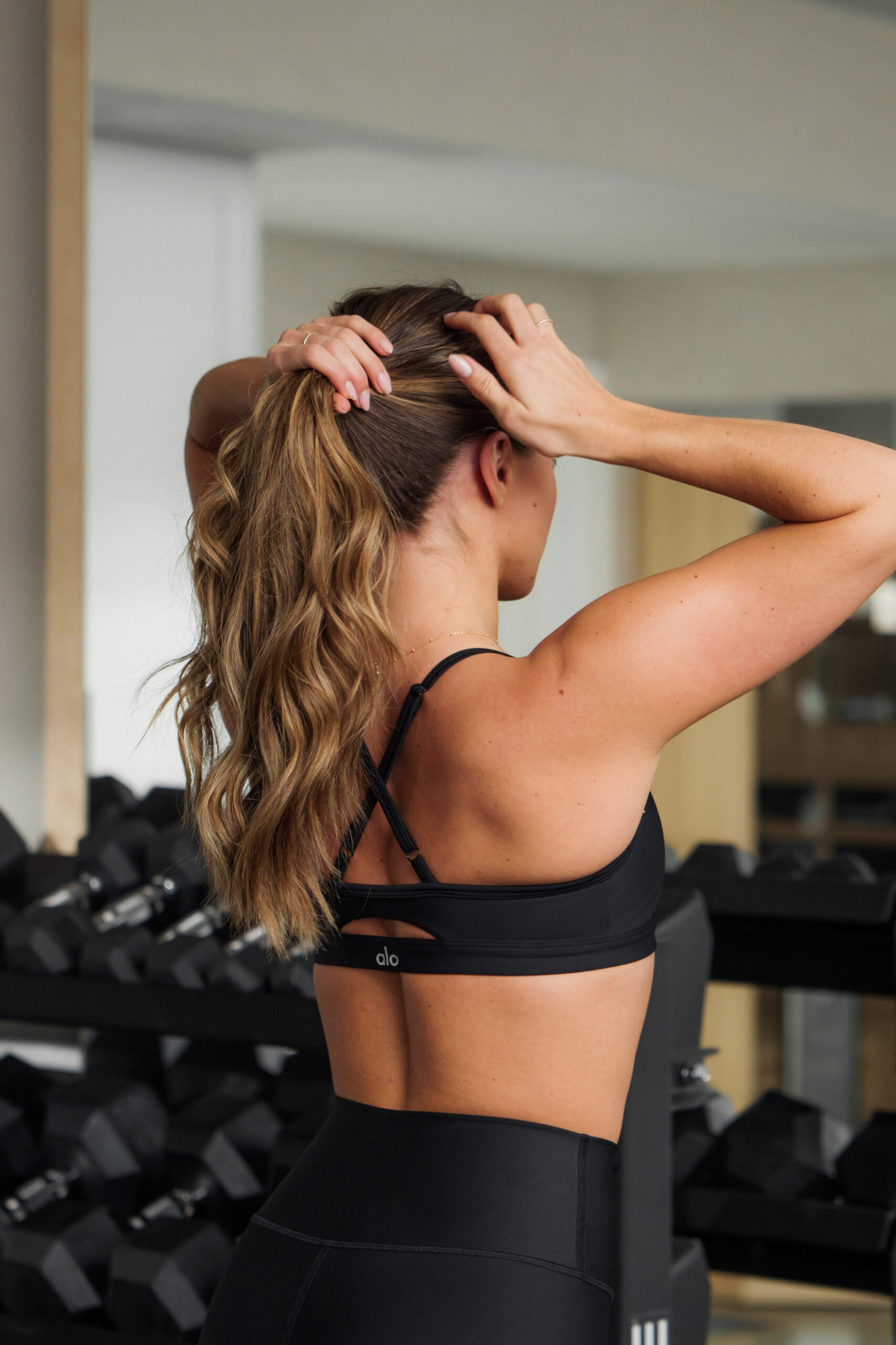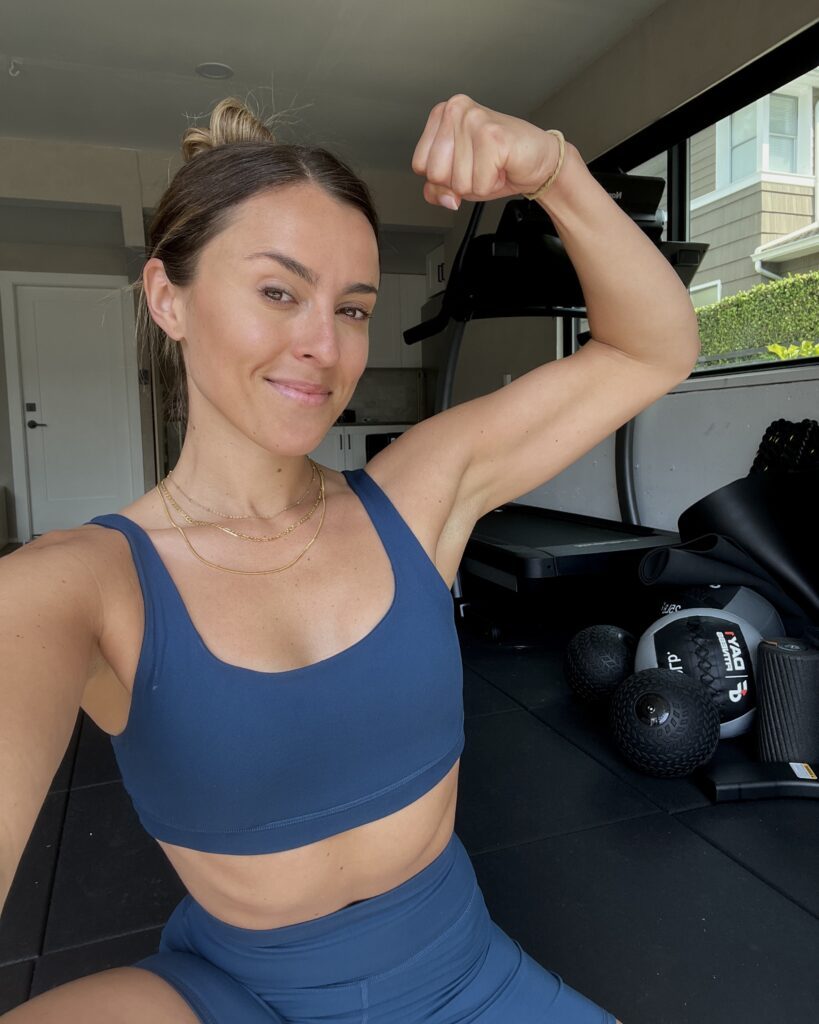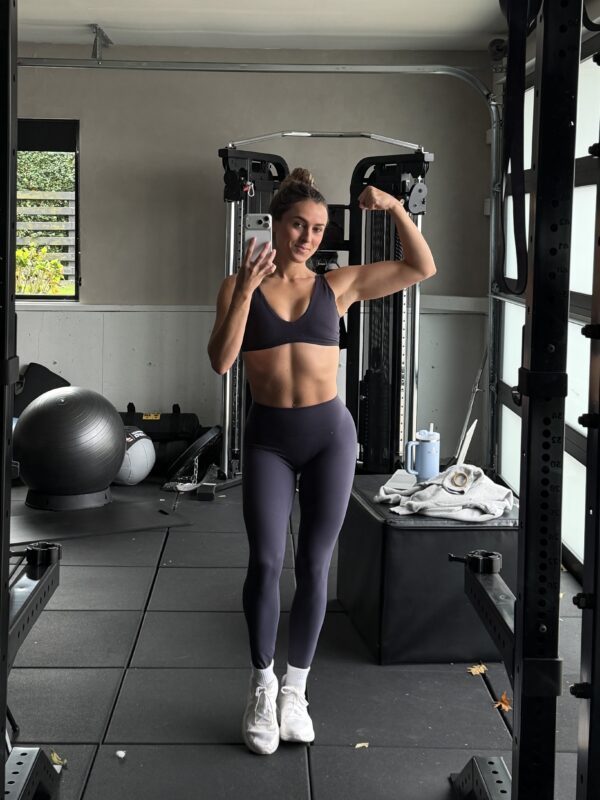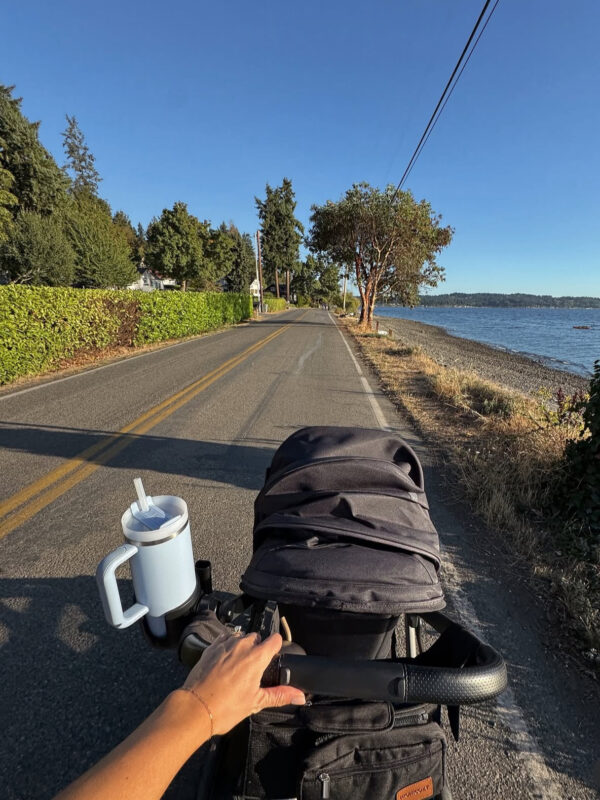
I just started our 8-week community challenge for GOOD // SWEAT Strength and I’ve never felt so motivated to honestly just get strong again postpartum. I just posted on my instagram stories that I’m taking creatine daily because of the many benefits it has for women. I’m sure you’ve heard of creatine, but I also know that it comes with plenty of misinformation.
You’ve probably heard of creatine as a supplement for bodybuilders or guys trying to bulk up. But the truth is that creatine is one of the most researched, effective, and safe supplements out there, and it can be a total game-changer for women too. I wish I would have leaned on it more during early postpartum days! Let’s break down what creatine actually does, why it’s beneficial for women, and how to start using it in your fitness routine.
What Is Creatine?
Creatine is a compound found naturally in your muscles and brain. Your body produces some creatine on its own, and you also get it from foods like red meat and seafood. But when you train hard—especially strength training—your natural stores may not be enough to maximize performance. That’s where creatine supplements come in.
Why Creatine Is Beneficial for Women

1. Improves Strength & Muscle Performance
Creatine helps your muscles regenerate ATP (aka, your energy currency) faster. That means more reps, better lifts, and more progress over time.
2. Supports Brain Function
Creatine can improve cognitive function, especially in women under stress or during sleep deprivation. Think focus, memory, and mental clarity.
3. Does Not Cause Bulky Gains
This is one of the most common myths!!! Creatine helps build lean muscle mass, not bulk. It enhances your tone and definition—ideal for strength-focused women.
4. Enhances Recovery
Creatine increases water content inside your muscle cells, which helps with hydration and recovery. That post-leg-day soreness? It might not hit as hard.
Common Myths About Creatine for Women

“Creatine causes water weight or fat gain.”
Creatine draws water into the muscle cells, not under the skin. You may see a slight bump on the scale, but it’s not fat—it’s improved hydration in your muscles.
“It’s only for men or bodybuilders.”
Nope! Creatine is beneficial for anyone who trains hard, including women who lift, do CrossFit, run, or even just want more energy during workouts.
“Creatine isn’t safe.”
What’s mind blowing is that creatine monohydrate is one of the most researched supplements in the world with an excellent safety profile—even for women.
“You have to cycle it.”
You don’t need to “cycle on and off” creatine, just take 3–5 grams daily and stay consistent!
How to Take Creatine
- Start with 3–5 grams per day
- No loading phase needed
- Take the same amount daily, whether you’re working out or not. Creatine supplements work best over time by saturating your muscles, so skipping it on non-workout days can slow down results.
- Take it anytime throughout the day, before or after your workouts—consistency is key
- Look for creatine monohydrate (the most studied form). This is my personal favorite brand of creatine linked here. I chose this creatine because it uses Creavitalis®, a highly purified, third-party tested form that’s known for better absorption and zero grit or bloating. I also just started using this one too and love it.
- Mix it with your water, smoothie, or post-workout protein shake. I like adding to my coffee in the morning, using an electric whisk to mix together. I’ll also add to my smoothies in the afternoon sometimes too.
Creatine for Pregnancy and Breastfeeding
Creatine isn’t just for strength gains in the gym, there’s growing research around its potential benefits during pregnancy and while breastfeeding, too.
During Pregnancy
Pregnancy puts extra demand on your body, especially when it comes to energy. Creatine plays a key role in how our cells make energy, and some early research shows it may help support both mom and baby during this time. One study even suggests creatine may help protect the baby’s brain during low-oxygen situations (like labor) and could potentially reduce injury linked to outcomes like cerebral palsy (Hudson Institute).
I think we’ll see a lot more research on this coming out in the next few years.
While Breastfeeding
Creatine is actually naturally present in breast milk, which surprises a lot of people. Research suggests breast milk provides about 9% of an infant’s daily creatine needs (NIH), which makes sense when you think about how important energy metabolism is for growth and development.
Some researchers have looked at whether maternal creatine supplementation during breastfeeding could help support infant creatine status or reduce the risk of deficiency—but it’s important to say this clearly: the research here is still limited, and most of what we have is observational or pre-clinical.
So while the idea is interesting and biologically plausible, we don’t yet have strong human data to make broad recommendations. This is one of those areas where science is evolving, and I’m personally excited to see where future research goes.
As always, if you’re breastfeeding and thinking about adding creatine (or anything new), it’s a good idea to run it by your OB or pediatrician so you can make the decision that feels right for you.
Is It Safe?
For healthy adults, creatine is one of the most well-studied supplements available and is generally considered safe at daily doses of 3–5 grams.
That said, pregnancy, postpartum, and breastfeeding are unique seasons with different nutritional needs (and fewer large-scale human studies) so I always recommend getting your doctor’s green light before supplementing (Health.com). It’s just about making informed, individualized choices during a sensitive time.
I personally took creatine off and on during pregnancy and postpartum, but wish I leaned on it more for its brain benefits.
Is Creatine Right for You?
If you lift weights, move your body regularly, or care about feeling strong and recovering well, creatine might be worth considering. It’s one of the most researched supplements out there, it’s simple, affordable, and for many people, genuinely helpful.
That said—creatine isn’t mandatory, and it’s not a magic pill. It’s just a tool. A good one, but still optional.
If you’ve been curious but hesitant because of outdated fitness myths (or the idea that creatine is “just for men” or bodybuilders), this is your permission slip to look at it with fresh eyes. Creatine can support strength, performance, and even cognitive function—and it can fit into a very balanced, very normal wellness routine.
As always, the best supplement is the one that makes sense for your body, goals, and season of life! 🙂
Click here for my go-to creatine brand.
















This is a great summary. I have done a lot of research on my own about creatine while breastfeeding, and have been frustrated that my care providers don’t have a robust enough understanding to tell me whether they think it’s safe or not. Thank you for compiling this with sources!